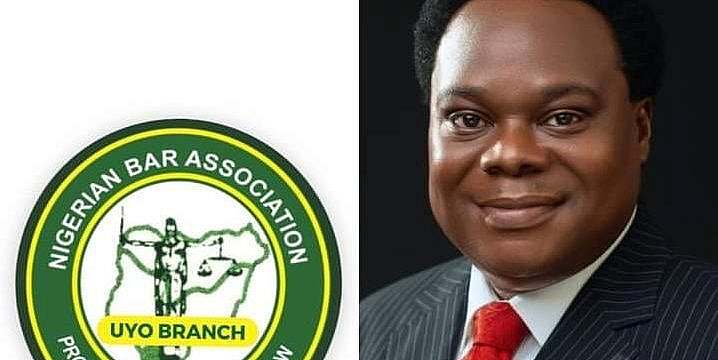AN ADDRESS PRESENTED BY AUGUSTINE ENEFIOK UDOH, ESQ. CHAIRMAN, NIGERIAN BAR ASSOCIATION, UYO BRANCH, ON THE
OCCASION OF THE OPENING OF THE LEGAL YEAR 2024/2025 CEREMONY OF THE AKWA IBOM STATE JUDICIARY HELD IN THE
MULTIPURPOSE HALL OF THE AKWA IBOM STATE JUDICIARY HEADQUARTERS TODAY MONDAY THE 14TH DAY OF OCTOBER, 2024.
Today, we gather to mark and commemorate the opening of the new Legal Year
2024/2025 of our Judiciary, a momentous occasion that underscores the vital role of
the Judiciary and the Bar in our democracy and our collective commitment as stakeholders to Justice, the Rule of Law, the welfare and protection of the rights of our citizens and the administration of Justice.
On behalf of members of the Bar of Akwa Ibom State, comprising the four branches of Uyo, Ikot Ekpene, Eket and Oron, I welcome My Lord the Honorable Chief Judge of Akwa Ibom State, Honorable Justice Ekaette F. F. Obot, My Lords Judges of Akwa Ibom State Judiciary, My Lord the Administrative Judge and brother Judge of the Federal High Court Uyo, My Lord the Presiding Judge of the National Industrial Court, Uyo and My Lords of the Court of Appeal sitting in various jurisdictions of the Country back from their well deserved vacations. I also welcome their Worships
of the Magistracy, the Chairmen of District Courts who today are looking very conspicuously grand and amazing in their brand new ceremonial robes and our Dispute Resolution officers to this occasion.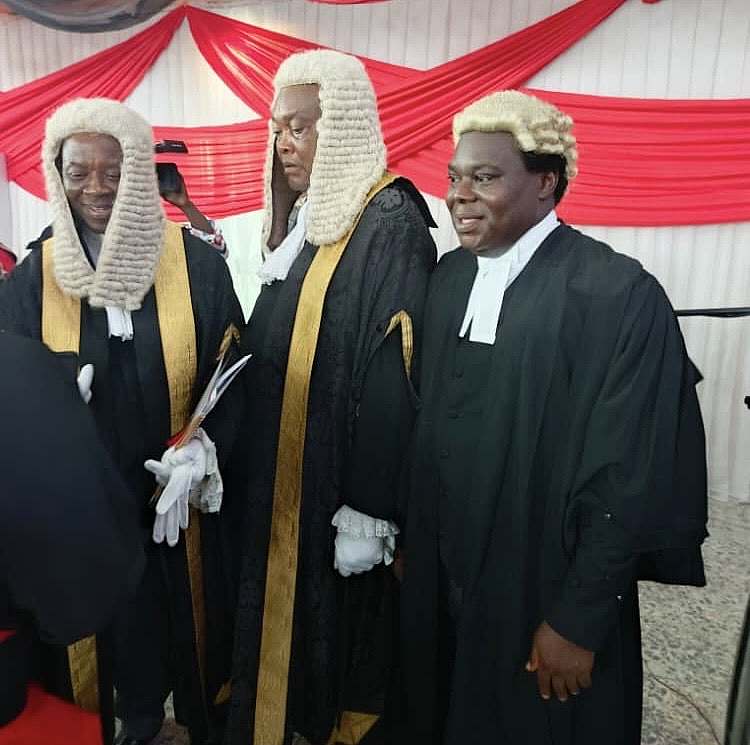 My Lord the Chief Judge, My Lords, members of the Bar, permit me to celebrate with you the remarkable achievements of the Bar and the Judiciary during the last legal year which marked a significant inclusive growth in the participation of our Bar Men and Jurists in the affairs of our Advocacy and National Judicial System.
My Lord the Chief Judge, My Lords, members of the Bar, permit me to celebrate with you the remarkable achievements of the Bar and the Judiciary during the last legal year which marked a significant inclusive growth in the participation of our Bar Men and Jurists in the affairs of our Advocacy and National Judicial System.
The Bar received with great joy, the elevation of one of our admirable advocates, EMMANUEL ENOIDEM, ESQ. to the rank of Senior Advocate of Nigeria (SAN) and subsequently, the Bar and the Judiciary celebrated the elevation of one of their finest specie of Jurists, HON. JUSTICE NTONG FESTUS NTONG (Now JCA) to the Court of Appeal To the Glory of God, members of the Eket Bar successfully held their Branch elections and a new Executive Committee was sworn in ably led by the new Branch Chairman, Peter Ime Akpan, Esq.
My Lord at the recently concluded National elections of the NBA we voted massively and produced the first ever Female National Treasurer of the NBA from Uyo Branch and from the Law
Officers Association of Nigeria Akwa Ibom State Chapter, Mrs. Blessing Udofa-Poromon. We pray God to grant them the needed Wisdom and Grace to excel in their new roles and pray for more elevations for our Jurists and bar men to higher roles of responsibility at the National levels of our Judicial system.
In this light, I also express my wholehearted commendation to the Honorable Chief
Judge of our State for the establishment of the SMALL CLAIMS COURT around the Magisterial Districts of the State to provide speedy, affordable self-access to justice for litigants seeking recovery of monetary claims not exceeding N5 Million
without the necessity of engaging legal practitioners at some high cost in a process
made simple and seamless for the average and low income litigant.
Your exceptional leadership drive in the administration of criminal justice system is
commendable. Your proactive policies from regular prison visits to the expeditious resolution of unduly prolonged cases reflect a genuine commitment to justice.
The release of inmates facing several offenses who have been in custody for years demonstrates a compassionate and principled approach towards alleviating the challenges faced by the leadership of the Nigerian Correctional Service over the highly congested state of the various Custodial Centers in the State, these has been made possible by the collaborative efforts of the office of the D.P.P, the State Directorate of Legal Aid, the Police Prosecutions Department under the Office of the Commissioner of Police, the Administration of Criminal Justice Monitoring Committee and the State Controller of the Nigerian Correctional Service.
It is our fervent believe in this legal year that your further visit will enable you to give kind
consideration to more of such cases where the release of such inmates would further
meet the ends of justice delivery.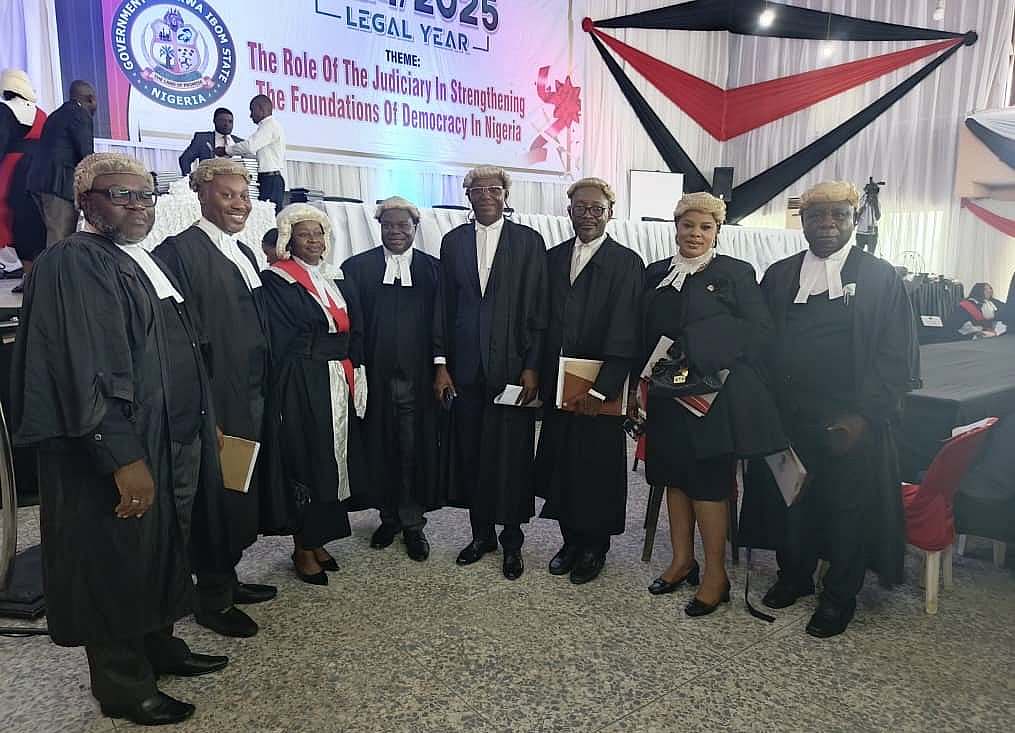 I also extend the appreciation of members of the Bar to the High Court Judges in Akwa Ibom State. Your unwavering dedication and hard work have greatly contributed to the delivery of justice. However, I must also admonish you most
I also extend the appreciation of members of the Bar to the High Court Judges in Akwa Ibom State. Your unwavering dedication and hard work have greatly contributed to the delivery of justice. However, I must also admonish you most
respectfully, to remain vigilant against undue political interference and distractions.
Your integrity and impartiality are the essence of our judicial system and must be
preserved at all costs.
As we convene here today, it is imperative to remind ourselves of the profound principles that guide our work and duties as stakeholders in the Judicial arm of Government. The Judiciary is not merely a system of courts; it is the bedrock of
fairness and equity in our society. It is our duty, now more than ever, to remain resolute in the face of challenges, to ensure that justice is not only done but is seen to be done. We must continue to foster an environment where the rights of our
citizens are upheld and the rule of law prevails. However, this collective commitment is being jeopardized or frustrated by pressing concerns to the independence of our Judiciary that threaten the very fabric of our Judicial system. The Nigerian Bar Association of Akwa Ibom State has consistently voiced its apprehensions regarding
the poor state of the Judiciary, and I feel compelled to bring these salient issues to the forefront today.
1. **Non-Appointment of Judges**: The backlog of cases in our Courts continues to grow as a direct consequence of the prolonged vacancies in our courts. The non-appointment of judges hampers the efficient delivery of justice, a fundamental right
for every citizen, though the processes are ongoing, it would be just effective and expedient to secure the completion of the process to allow for speedy dispensation of justice and the decongestion of the cause lists of our Judges to enable them meet their set targets for the legal year. We currently have 33 High Courts and only 23 Judges, leaving a huge deficit of 10 Judges to fill the vacancies.
2. Poor Staffing of the Judiciary: Many Judicial officers at all tiers of our state judiciary are overburdened with responsibilities due to inadequate staffing. This not only affects the quality of judgments but also leads to delays in our administration of justice system that undermine public confidence in our legal system. Staff who
were employed years ago as cleaners, security men and messengers are now the ones taking up the roles of Court Clerks, Registrars and bailiffs with little or no training and experience in those sensitive positions.
3. Non-Provision of Official Vehicles: Our Judges, Magistrates, District Court Chairmen, and Dispute Resolution officers are often without the necessary tools and official vehicles to perform their duties effectively. The non-provision of official vehicles severely impacts their mobility and access to justice and exposes them to the dangers of unlawful encounters with volatile litigants and undue influence from members of the public.
4. Poor Courtroom Infrastructure: Our courtrooms at all tiers across the state must reflect the dignity and seriousness of the judicial process. The current state of courtroom infrastructure in Akwa Ibom State is not only inadequate but humiliating
for those seeking justice. There is no pretending about the fact that the infrastructure of some of our courts is in a state of comatose. Most court rooms like the District Courts across the state are uninhabitable with some in the shape of a storage facility.
The district court Chairmen are either sharing leaking offices with staffs and cannot effectively operate a court sitting with poor furniture manageable enough for just a few. It is a show of shame to exhibit what passes today as court rooms as a place for the dispensation of justice. The stationeries essential for running the courts are
lacking. Notwithstanding that litigants pay for filing of cases and equally pay for service of originating processes by the Bailiffs of the court, litigants still end up paying again for files and service of processes to activate the cases filed. Judges still largely write in long hands as modern technological devises are lacking. Most times,
courts are unable to transact businesses due to paucity of funds for power supply.
5. Lack of Proper Funding: Without proper funding, the Judiciary cannot fulfill its mandate. Budgetary constraints limit our ability to maintain facilities, hire competent staff, and ensure the overall effectiveness of the judicial process. These
challenges demand our immediate attention and action. We must advocate collectively for the resources necessary to strengthen our Judiciary, ensuring that it operates efficiently and effectively. The Nigerian Bar Association in Akwa Ibom
State urges the Government of Akwa Ibom State to prioritize the pressing needs of the Judiciary, especially concerning the timely release of budgetary provisions. The commitment to infrastructural development within our Judiciary is not merely an administrative task; it is a fundamental responsibility that impacts the efficacy of justice. An adequately funded Judiciary is essential for upholding the rights of our
citizens and ensuring that justice is administered without hindrance.
6. Improvement in the Salaries and Allowances of Magistrates, District Court Chairmen and other judicial Officers: Very recently, the salaries of our Judges in the State received a massive boost with a 300% increment across the Nation, the conditions of the Magistrates, District Court Chairmen and Dispute Resolution officers remain appalling and incapable of enabling them to meet the current
economic challenges of their adjudicatory responsibilities considering their enormous responsibilities. We strongly advocate that the salaries and allowances of the Magistrates, District Court Chairmen and D.R.Os be increased by 300% across the state, this will enable these Judicial officers to perform their assigned roles optimally and access credible means of doing the business of law adjudication without facing economic challenges.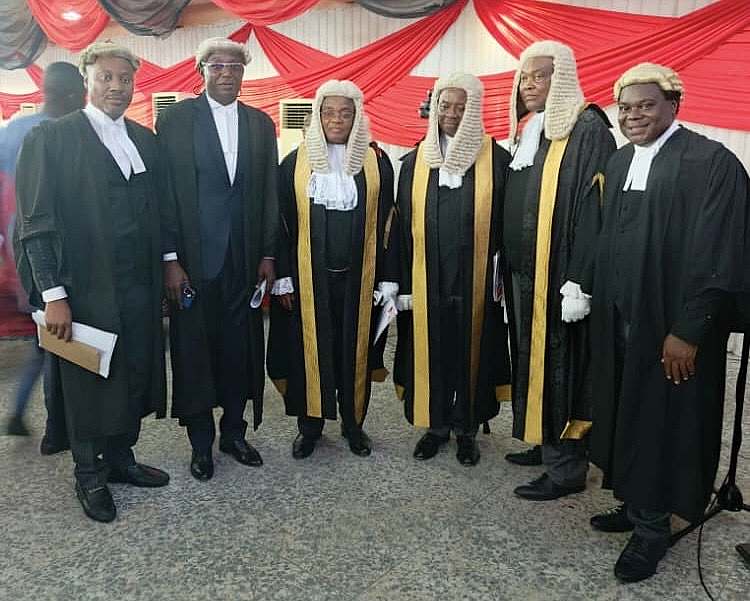 ESTABLISHMENT OF A COURT OF APPEAL AND A CUSTOMARY COURT OF APPEAL IN AKWA IBOM STATE.
ESTABLISHMENT OF A COURT OF APPEAL AND A CUSTOMARY COURT OF APPEAL IN AKWA IBOM STATE.
My Lord the Chief Judge, this fundamental desire is not merely a legal reform but a significant stride towards enhancing access to justice, preserving our cultural heritage, and strengthening the rule of law in our state.
The Importance of a Court of Appeal
1. Access to Justice: Akwa Ibom State, with its growing population and increasing complexity of legal matters, requires a dedicated Court of Appeal. Currently, citizens and legal practitioners from Akwa Ibom State must travel long
distances to seek justice at the Court of Appeal in neighboring Calabar, Cross River State. This not only burdens our Lawyers and citizens with the dangers and hazards of travel by road and water with the attendant travel costs and time but also creates disparities in access to justice. By establishing a Court of Appeal in Akwa Ibom, we
will bring justice closer to the people, ensuring that every citizen has the opportunity to seek redress without unnecessary hardships. The current statistics shows that about 85 percent to 90 percent of cases pending at the Court of Appeal Calabar are appeals from Akwa Ibom State High Courts.
2. Expeditious Resolution of Cases: The backlog of cases in our existing courts is a pressing issue that hampers justice delivery. A Court of Appeal in Akwa Ibom would alleviate this burden by providing a specialized mechanism to handle
appellate matters efficiently. This will lead to quicker resolutions, thereby enhancing public confidence in our judicial system.
3. Enhancing Legal Precedents: A local Court of Appeal would contribute to the development of legal precedents that are directly relevant to our unique socio-economic and cultural contexts. This localized jurisprudence will ensure that the
decisions made reflect the values and realities of our state, fostering a more relatable and effective legal framework.
4. Promotion of Legal Education: The establishment of a Court of Appeal
would also serve as a catalyst for legal education and professional development in our state. It would create opportunities for local lawyers to engage in appellate practice, thereby raising the bar of legal practice and nurturing a new generation of legal minds who are committed to upholding justice.
Importance of a Customary Court of Appeal.
1. Recognition of Customary Law: Our state is rich in cultural diversity, with a vast array of customs and traditions that govern the lives of our people. A Customary Court of Appeal would provide a dedicated forum to address disputes arising from customary laws, which are integral to our societal fabric. This recognition is crucial for the preservation of our cultural heritage and promotes
respect for our traditions within the legal framework.
2. Conflict Resolution: Customary courts are often more accessible and acceptable to the local populace. They provide a platform for dispute resolution that aligns with the community’s cultural norms. By establishing a Customary Court of Appeal, we would enhance the effectiveness of conflict resolution mechanisms within our communities, ensuring that justice is not only done but seen to be done in a manner that resonates with our people. The burden on appeals at the High Courts will be completely taken off to reduce the cause list of appellate matters before our High Court Judges.
3. Integration of Customary and Statutory Law: The establishment of a Customary Court of Appeal will facilitate the harmonization of customary and
statutory laws, ensuring that they complement rather than conflict with each other.
This integration is vital for fostering a cohesive legal system that respects our traditions while upholding the principles of justice and equity.
4. Empowerment of Local Communities: By providing a dedicated judicial avenue for customary matters, we empower local communities to have a say in their governance and legal processes. This empowerment fosters trust in the legal system and encourages community involvement in upholding the rule of law.
I urge My Lord the Chief Judge, the Governor, and all stakeholders to prioritize this initiative. Together, let us forge a path towards a more just, equitable, and culturally sensitive legal system that serves all the citizens of Akwa Ibom State.
In conclusion, as we embark on a new legal year, let us renew our commitment to serving the people of Akwa Ibom State. Let us work collaboratively to address these concerns and ensure that our Judiciary remains a beacon of hope, an advocate for justice, and a promoter of the rule of law. Together, we can ensure that the rights of
citizens are protected, that justice is dispensed fairly, and that the administration of justice is enhanced for all.
Moreover, it is crucial for all arms of government and their agencies to respect the rule of law. Compliance with court judgments is not merely a legal obligation; it is a testament to our shared commitment to democracy and governance. When the government upholds judicial decisions, it reinforces the integrity of the legal system
and fosters public confidence in our institutions.
As stakeholders in this justice system, it is essential to cultivate a professional, cordial, and respectful relationship between the Bar and the Bench. Our collective goal is to uphold the standards of our profession while promoting ethical conduct. A
robust collaboration between legal practitioners and judges strengthens our commitment to justice and enhances the profession overall.
In this vein, I assure our Chief Judge and the entire Judiciary of the undivided loyalty of the Bar. We pledge our continued support towards achieving the goals and objectives set forth for the Judiciary. Together, we will navigate the challenges
ahead, ensuring justice is not only served but is accessible to all citizens.
Long live My Lord the Honorable Chief Judge of Akwa Ibom State and our Judges
of the Akwa Ibom State Judiciary.
Long Live the Akwa Ibom State Judiciary.
Long live the Akwa Ibom State Branches of the Nigeria Bar Association and her
members.
I wish you all a very rewarding and successful legal year.
Thank you for listening.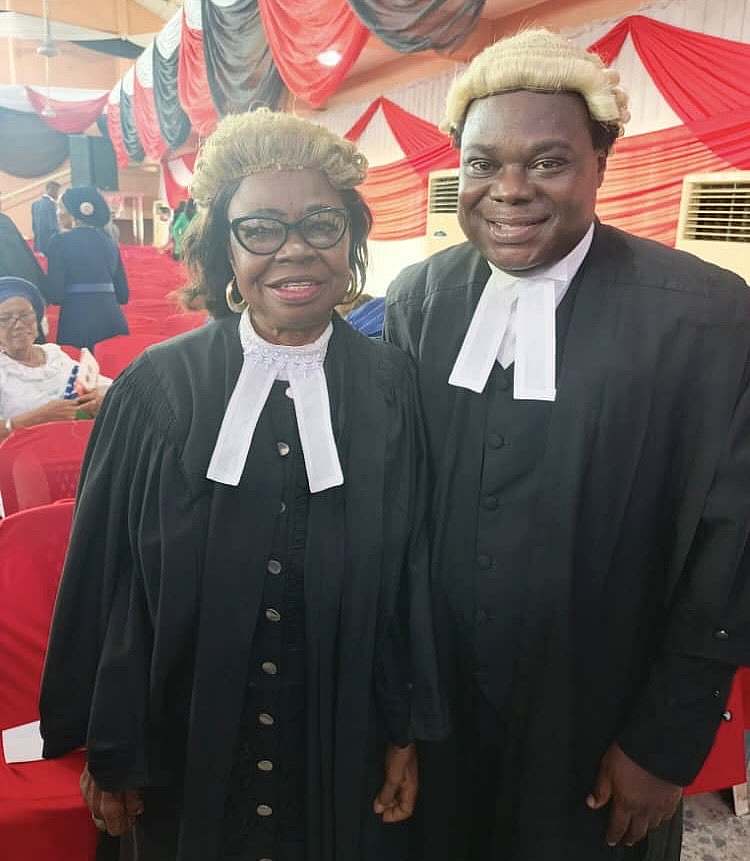 •Augustine Enefiok Udoh, Esq.
•Augustine Enefiok Udoh, Esq.
Chairman, Nigerian Bar Association,
Uyo Branch;
For and on behalf of the NBA branches of Ikot Ekpene, Eket and Oron.
In defence of Communal Values.

